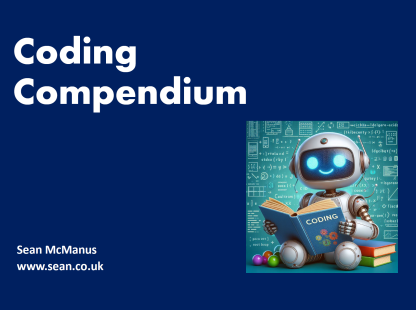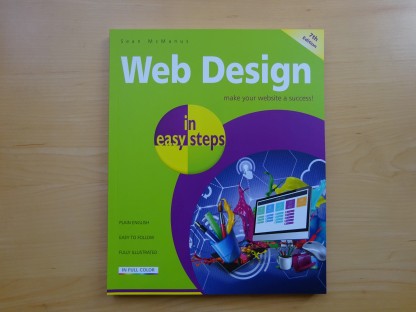
Coding Compendium
A free 100-page ebook collecting my projects and tutorials for Raspberry Pi, micro:bit, Scratch and Python. Simply join my newsletter to download it.
December 2008
Here are my answers to questions I've been sent by my website visitors about training to be a journalist. They're just my opinion, but I hope you find them helpful.
I don't think subject choices at school will make a big difference to your career given the constraints put upon your choices. A good English result is extremely helpful and often necessary and some humanities subjects (geography, history) help to show that someone can handle abstract ideas and write about them. But there are plenty of jobs in technical magazines and newspapers writing about science and technology and foreign languages are an asset when researching most industries. If schools are the same now as they were when I was choosing (admittedly some time ago), they'll force students to have a mix of science, humanities and languages and will require English and maths.
You should have an aptitude for English language, but that doesn't mean you have to pursue further study of it.
Unless you have a very clear idea of what you want to write about (and it's better to keep your options open), any set of reasonable results should do fine at this stage and open lots of doors for a variety of journalism jobs further down the line. Most publishers will require you to do a degree or journalism training after school, but they won't mind what your subjects are.
Pick subjects you enjoy or have a natural talent for, keeping in mind that you'll need to study some in much more detail later (possibly to degree level).
Look out for opportunities to get work experience in journalism (this might require some initiative organising your own work experience during the school's work experience week if the school doesn't have suitable links with local publishers). Experience usually counts for more than education in journalism when there's competition for a job. Applicants often have the same qualifications but will have done different things with their spare time to show a commitment to the job. That's what makes the difference.
If you have a chance to do a course, do it as long as you're sure the benefit to you justifies the time and expense. There are three main ways that taking a course in journalism can help your career:
You don't necessarily have to do a course. There are several on-the-job training programmes that will accept graduates in a discipline other than media. As long as they give you a real chance to learn quickly, they're a cheaper way to start than paying for a course. Companies often tie these schemes to internal recruitment, so there's a good chance of a job at the end of it.
Not necessarily. There are adequate shorter courses in journalism if your aim is just to acquire the skills you need to do the job.
If you're picking your degree course now, consider subjects other than journalism. Having a non-journalism degree plus journalism training (which you can acquire later) or media experience opens more doors for you because it gives you an area of expertise to write about. Perhaps the majority of writing jobs are in working for business-to-business and technical publications. Adverts often seek a proven writer with a degree in biology or law (for example). I've heard employers say that they prefer someone with a first degree that is not journalism because otherwise people are trained to write but don't have anything to write about.
If you're passionate about journalism, its political implications, media law and so on then it's worth studying journalism in greater depth, but if not you probably won't be worse off for taking a non-media degree course.
A postgraduate course in journalism is helpful in the UK and perhaps even a pre-requisite for getting into broadcasting. I've heard that in the US you need a media degree to be taken seriously, but I still think you could market yourself successfully with alternative qualifications if you tried the right media outlet.
Although experience is what's likely to get you into journalism, I think it's essential to take up university or similar education if you have the chance. There are a few reasons for this. One of them is that it's a good preparation for the world and gives you space to grow. The skills you acquire by studying (such as in thinking, analysis and debate) are valuable for the job and a degree will give you a certain level of general knowledge which is handy for any journalist.
University also gives you lots of relevant opportunities (student newspaper, entertainments committee etc) to get experience.
Three years is a long time whatever you're doing, so pick a subject and university or college that you think you'll enjoy and make that your top priority.
If you've got a job offer on the table, it could be tempting. But you should think about whether this job is a long term opportunity. Having a completed degree will be much more valuable to you than a part-completed course when you're applying for most future jobs.
If you freelance, each article is judged on merit and nobody cares what you've done with your past. That can be hard to break into without experience on staff at a publication though.
If you're not enjoying your course, there might be ways to make it more relevant for you: for example, see each essay as a journalism assignment and write it in a publishable style (if you can get away with that) or halve your deadline (which often happens in media) and call it a dry run for the working world. With many assignments you'll find there's a way you can learn something new that you need without breaking too far out of the context of the course.
Journalism is a dream job for many: lots of people would love to be paid to write. Of course, their view of a journalism career might change once they realise that their creative energies have to be finely channelled to please readers and not their muse.
These people are a market ready to be exploited and although there almost certainly are credible writing courses, a lot of the course operators seem to advertise in mainstream publications and promise a dream come true, rather than advertising in media-specific publications and selling the training itself.
In theory correspondence courses are a great way to learn to work freelance because they require the time-planning skill that is essential for successful freelancing.
They also make it easier for people to study while they work to support themselves.
To find a good course, look out for:
Courses that guarantee passing can't have that high a standard. Some courses invent universities or over-inflate their importance to hook in punters. I see so many courses that invent colleges in Cambridge or Oxford (usually for the benefit of overseas students) that have nothing to do with the famous universities in those towns.
I think you'd need to see significant value over just teaching yourself with books you buy before you start paying much more than the cost of the books. That value might just come from a recognised certificate or guidance from working journalists on your writing.
Probably not. Sorry.
I can tell you that the magazine journalism courses I did at PMA are very good.
I also did a course in Photojournalism at the London School of Photojournalism and I enjoyed it but I'm not convinced it opened many doors for me or significantly raised my skill level, although it did teach me a lot about technique and some of the issues surrounding photojournalism. Somebody with more time or commitment might have benefited more from the course.
But I don't think it's fair for me to comment on courses I haven't studied or - in many cases - haven't heard about. If you follow the suggestions above, you should be able to judge whether the course is good for you now - and that's what counts.
Lots of people take courses, so consider what will set you apart when you all go job hunting at the same time.
Use the time on the course to pick up a few freelance commissions if you can, and try to plan work experience for the holidays. It is worth working a bit harder to make time for this kind of thing because the sooner you show you can work professionally, the easier it will be to acquire real experience and get the kind of job you want later.
It will also give you a taste of the kinds of jobs you want to do and what you don't like so much before you find yourself doing a job full time.
© Sean McManus. All rights reserved.
Visit www.sean.co.uk for free chapters from Sean's coding books (including Mission Python, Scratch Programming in Easy Steps and Coder Academy) and more!

A free 100-page ebook collecting my projects and tutorials for Raspberry Pi, micro:bit, Scratch and Python. Simply join my newsletter to download it.

Web Design in Easy Steps, now in its 7th Edition, shows you how to make effective websites that work on any device.

Power up your Microsoft Excel skills with this powerful pocket-sized book of tips that will save you time and help you learn more from your spreadsheets.

This book, now fully updated for Scratch 3, will take you from the basics of the Scratch language into the depths of its more advanced features. A great way to start programming.

Code a space adventure game in this Python programming book published by No Starch Press.

Discover how to make 3D games, create mazes, build a drum machine, make a game with cartoon animals and more!